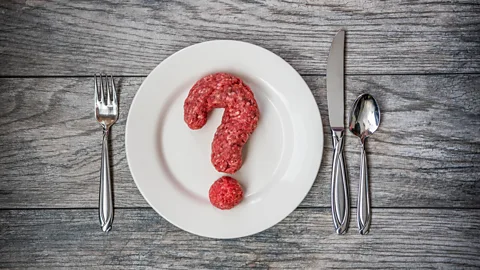 Alam
AlamSome people who stop eating meat have reported unpleasant effects when they return to it. Can your body forget how to digest meat?
Less meat eating is one of the simplest ways to reduce your carbon trail.
However, there is not much research if consuming meat after a long rest can cause an upset stomach, says Sander Kersten, a food professor at Cornell University in the SHA “Lack of evidence does not mean that it does not exist, it is simply that people have not studied it,” he reflects. “This is not always a satisfactory situation or answer, but it’s just what you should ever get.”
 Alam
AlamIt is possible – though it is very rare – being allergic to meat. Alpha-Gal syndrome, in which the immune system recognizes animal proteins as invaders, can lead to anaphylaxis and death. But this allergy, which can grow after a life of eating cheerful meat, has nothing to do with switching to a low meat diet. For example, you can develop the condition after a bite of ticks.
For many people who are avoiding meat, discovering that they have consumed it unconsciously can be emotionally painful – it can feel like a personal violation, says Kersten, who is a vegetarian himself. “It would make some people extremely sad,” he explains. “I don’t know if this would lead to physical symptoms. Of course it can cause a lot of anger.”
But when you consider digestive biology, it is not as reliable as you can imagine that the body can, for a long period of time, lose the ability to digest meat. Meat is generally very easily digested, unlike fibers in fruits, vegetables and legumes. To disrupt it, our bodies seek help from our microbioma, whose germs possess the enzymes needed for its digestion.
Moreover, the enzymes used to digest plant proteins are the same as those used in meat proteins. These enzymes recognize and share special chemical bonds in protein. Regardless of whether they come from plants or animals, proteins are made of building blocks called amino acids. Enzymes can generally ruin them no matter where they came from.
This process is different from the case I, to say, animal milk sugars such as lactose. To digest lactose, your body requires a specific enzyme called lactase, and people who do not produce enough enzymes, making them intolerant lactose, can suffer a creepy belly after eating milk products.
But with meat proteins, it makes no sense to think about the body by resting somehow to make the enzymes needed to digest a quiet hamburger – they are always there, disrupting any protein that comes through, whether from peas, soybeans or steak, Kersten says.
 Alam
AlamThe human intestinal microbiomy makes morphs and changes depending on what its host eats, however. Sometimes this means that the specific types of bacteria there vary; Sometimes it is only that germs make other enzymes. While there are differences between the microbiomas of omnivores and vegetarians and vegetarians, they do not seem to be radically divergentAs long as omnivores consume a variety of plants, research has found.
Microbiomers can be quickly shifted as a result of dietary changes, however-a study in which humans went through a fully-based diet showed that a shift away from their initial microbioma was visible within a day (She returned rapidly back to normal after the diet was over). The subjects were encouraged to report every embarrassment they thought, but nothing did it on paper.
If anything, it is the sudden consumption of large amounts of fibers after a long break that can cause digestive problems. Better is better eased in such dietary changes. “Depending on the fiber, you can have some very strong reactions to him,” Kersten says.
In short, concern about your body in a way losing the ability to digest meat should not damage any plans you need to extend the vegan in the spring. If you are one of those who have had an upset stomach after eating meat after a long break, a loss of enzymes is unlikely to be the culprit, though this phenomenon remains understood, says Kersten.
“The body is quite adaptable,” he continues. “Can do more than you think.”
